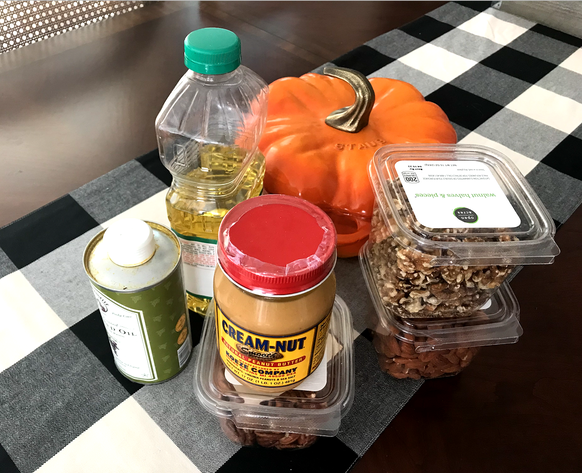BLOG
|
|
WHETHER OR NOT YOU ARE CONCERNED* WITH DIETARY INTAKE of essential and non-essential polyunsaturated fatty acids, (PUFA) you may have encountered the hype surrounding this nutritional issue. The simplified bottom line over the past few decades has been that “Omega-3’s” are good and “6’s” are not.
Thus, consumption of foods and supplements rich in omega-3 fatty acids EPA (eicosapentaenoic acid) and DHA (docosahexaenoic acid) like fatty fish (salmon, mackerel, sardines) and plant seeds (flaxseeds and chia seeds) has been promoted to improve cardiovascular health. Because foods that most commonly show up in our Western diets as the biggest sources of omega-6 fatty acids include snacks and other highly processed convenience/junk foods, rich sources of calories and fats in general, the 6’s have been considered the type of fats to avoid. What’s worse is the reputation difference between 3’s and 6’s in terms of inflammation potential. Omega 3’s have been cast as anti-inflammatory heroes; omega 6’s have been labeled as pro-inflammatory villains. This is an important distinction because long term, low-level, systemic (body-wide rather than localized) inflammation is known to be behind the development of many chronic conditions including cardiovascular disease, diabetes, neuro-degeneration, and cancer. https://www.nature.com/articles/s41591-019-0675-0 As a former dietitian all this information seemed to logically support the simple “3’s are good” and “6’s are bad” labels. That is, until I realized that “healthy” olive oil of Mediterranean Diet fame, is low in Omega-3 and high in monounsaturated and omega-9 fatty acids (another PUFA). And when scientific articles began to appear in my regular email updates from the NIH Library of Medicine that nuts and seeds should be increased in our diets, especially walnuts. Nuts and seeds are high in fat, and many are rich sources of omega-6 fatty acids. What? https://pubs.rsc.org/en/content/articlelanding/2012/FO/C2FO10152A [Before continuing further, a definition is in order. All PUFA molecules have a side chain comprised of multiple carbon atoms. The carbon atoms in the chain are connected to each other, joined by a single or “saturated”, carbon-to-carbon bond or a double, “unsaturated” C-C bond. PUFAs have many (poly) unsaturated bonds; saturated fats have, well, saturated single bonds. The Omega-3 PUFAs have one of their carbon-to carbon double bonds in the three position (third from the end of the chain). The Omega-6 PUFAs have one of their double/unsaturated bonds in the six position (sixth from the end).] https://www.ncbi.nlm.nih.gov/pmc/articles/PMC7037798/ Searching and reading for better understanding on this issue, I learned that the ratio of intake of the different omega’s to each other also effects health. Researchers think that early humans evolved consuming a ratio of about 1:1 (omega-3 to omega-6) fats, and experienced lower levels of lifestyle-related heart disease and diabetes than modern humans. Our Western diets typically provide a whopping 1:16-20 ratio of omega-3 to omega-6!!! https://www.healthline.com/nutrition/optimize-omega-6-omega-3-ratio I knew, in addition, that the story is complicated by the fact that excess adipose tissue in our bodies also generates inflammation. So, by ingesting the many calories contained in “bad 6’s” snack food fats, we tend to make more calorie storage (adipose or fat) cells that increase our risk of living in the harmful state of chronic inflammation for decades. https://www.nature.com/articles/s41591-019-0675-0 My take was that it is best to strive to consume a 1:1 (omega 3: omega 6) ratio by: -decreasing my intake of excessive junk omega-6 fats that would add inflammatory adipose tissue (fat cells) -substituting them with healthier omega-6 rich nuts and seeds, especially walnuts -and adding more omega 3’s in whole foods I thought my mental game approach to the 3’s and 6’s was in place and ready to put into practice. However, recently I happened across a relatively short August 2019 Harvard Health Bulletin article that called into question the pro-inflammatory influence of omega-6 fats. https://www.health.harvard.edu/newsletter_article/no-need-to-avoid-healthy-omega-6-fats The piece indicates that an American Heart Association (AHA) advisory committee, ”two years in the making”, believes that intake of dietary omega-6s benefits cardiovascular health. And that research has debunked the charge that most omega-6 Linolenic Acid (LA) is converted to precursor molecules (arachidonic acid) that promote inflammation. Other newer scientific articles also seem to shift away from making blanket statements labeling omega-6’s as pro-inflammatory but less clearly and boldly. This change in perspective is best explained in the Harvard Health piece, “No Need to Avoid Healthy Mega-6 Fats”, the reason for this blog post. To me it’s almost a 180-degree turnaround from what has been preached by academic nutritionists and seconded by amateur experts. I expect to see more reversals as researchers shift approaches to the study of human nutrition and disease. My personal healthy-fat-intake strategy (outlined above) won’t be drastically changed because of learning of this new viewpoint, but my reading of the literature going forward will be altered. I’ll be looking to learn of other attitude shifts in the scientific community toward dietary fats, including saturated fat, especially in dairy foods. In the future, other foods that were considered harmful may be found to be helpful in promoting health, when taken in context of how much is ingested, especially relative to what else is eaten. *Why does this matter to athletes? Because our dietary choices should be informed rather than misinformed, so that our good exercise habits aren’t negated by poor nutrition habits but rather boosted by them. It’s a shame to avoid foods and snacks that we find help us perform during and recover after athletic efforts if we mistakenly think they are “bad.” Hopefully manufacturers will take note and offer new and improved products. Check out the Harvard article for a nicely written explanation of why the “6’s” don’t need to be avoided but balanced with “3’s” closer to a 1:1 ratio than a 20:1 ratio, and which sources of each are best. RUN & MOVE HAPPY! https://www.webmd.com/diet/features/what-to-know-about-omega-3s-and-fish https://www.mayoclinic.org/diseases-conditions/heart-disease/expert-answers/omega-6/faq-20058172
0 Comments
Your comment will be posted after it is approved.
Leave a Reply. |
BRIDGE TO PHYSICAL SELF
Running, walking, and fitness activities enable us to experience our physical selves in a world mostly accessed through use of fingers on a mobile device. AuthorEARNED RUNS is edited and authored by me, runner and founder. In 1978 I began participating in 10K road races before 5Ks were common. I've been a dietitian, practiced and taught clinical pathology, and been involved with research that utilized pathology. I am fascinated with understanding the origins of disease as well as health and longevity. Archives
November 2023
CategoriesNew! Search Box
Earned Runs is now searchable! Check it out...
|


 RSS Feed
RSS Feed